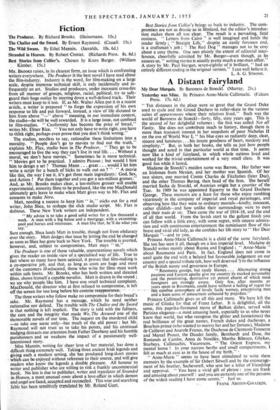Fiction
The Producer. By Richard Brooks. (Heinemann. 15s.) Stranded in Heaven. By Robert Crottet. (Richards Press. 8s. 6d.) Best Stories from Collier's. Chosen by Knox Burger. (William ICimber. 15s.)
MR. BROOKS raises, in its clearest form, an issue which is confronting writers everywhere. The Producer it the best novel I have read about the film-industry. Industry is the word, for film-making on a large scale, despite immense technical skill, is only incidentally and in- frequently an art. Studios and producers, under incessant cross-fire from all manner of groups, religious, racial, political, try to safe- guard their huge outlay by steering down a well-defined track. Their writers must keep to it too. If, as Mr. Walter Allen put it in a recent atticle, a writer is prepared "to forgo the expression of his own response to life and put forward, instead, a view of life dictated to him from above "—" above" meaning, in our immediate context, the studio—he will be well rewarded. It is a large issue, not confined to film-studios. "Conformity has become the price of bread," writes Mr. Elmer Rice. "You not only have to write right, you have to think right, perhaps even prove that you don't think wrong."
The studios, needless to say, rationalise these limitations into a morality. "People don't go to movies to find out the truth," explains Mr. Flax, studio boss in The Producer. "They go to be encouraged to live the way they can't live in real life. . . . Without a moral, we don't have movies." Sometimes he is more technical. "Movies got to be practical. I admire Picasso ; but would I hire him to design a set ? Thomas Mann . . . great . . . would I let him write a script for a bunch of hicks to walk out on ? " "A movie like this, the way I see it, its got three main ingredients : God, Sex, and Action ! Put them together and you got a ten-million grosser." And, as Mr. Brooks makes clear, a ten-million grosser will enable experimental, minority films to be produced, like the one MacDonald ultimately gets leave to make when Matt gives way to Mr. Flax and consents to make Nero.
Matt, needing a success to keep him " in," sticks out for a real writer, John Shea, to reshape the slick studio script. Mr. Flax is dubious. These New York writers are independent.
" My advice is to take a good solid writer for a few thousand a week. A man with a big house and a mortgage, with a swimming- pool and horses and mistresses. A man like that, he'll do what you say.'" Sure enough, Shea lands Matt in trouble, though not from obduracy over the story. Matt dodges that issue by letting the end be changed as soon as Shea has gone back to New York. The trouble is averted, however, and, subject to compromises, Matt stays "in."
The Producer is one of those valuable, unpretentious novels which gives the reader an inside view of a specialised way of life. True to fact where so many have been satirical, it proves that film-making is a co-operative job, and that, as long as costs are huge and most of the customers ill-educated, those who write for films must work within safe limits. Mr. Brooks, who has both written and directed films, shows himself a capable novelist. Matt is drawn in the round ; we see why people like him. I have one small technical complaint. MacDonald, the director who at first refused to compromise, is left off the screen for too long before his contrite Teappearance-.--- -- — The three writers who follow make no compromise for their bread's sake. Mr. Raymond has a message, which he need neither rationalise nor defend. The trouble with The Chalice and the Sword is that nothing is left implicit. The story is told with the fullness, the care and the integrity that made We, The Accused one of the themorable novels of our time. The inquest on the murdered child —to take one scene only—has much of the old power : but Mr. Raymond will not trust us to take his points, and his continual nudging distracts our attention from Father Dawbeny and his humble parishioners and so weakens the impact of a passionately well- intentioned story.
Miss Mannin, writing for sheer love of her material, has done a difficult thing extremely well. Taking three ancient Irish legends and giving each a modern setting, she has produced long-short stories which can be enjoyed without reference to their source, and will give readers who know the legends a double pleasure. All honour to writer and publisher who are willing to risk a frankly uncommercial book. No less is due to publisher, writer and translator of Stranded in Heaven, a most unusual come about a love-affair in which demon and angel are faced, accepted and reconciled. This wise and searching fable has been sensitively translated by Mr. Roland Gant. Best Stories from Collier's brings us back to industry. The com- promises are not as drastic as in frlinland, but the editor's introduc- tion makes them all too clear. The result is a pervading, fatal cosiness. "Letters from Cairo" is well imagined and holds the reader firmly ; "Straight Life," despite an easily foreseen end, is a craftsman's job ; "The Red Dog" manages not to be cosy about a cosy theme. One sees plainly the extent of editorial inter- ference, cheerfully admitted by Mr. Burger—even though, as he assures us," writing stories is usually pretty much a one-man affair." A story by Mr. Paul Horgan, seven-eighths of it brilliant, "had an entirely different ending in the original version." I can well believe it.
L. A. G. STRONG.






























 Previous page
Previous page